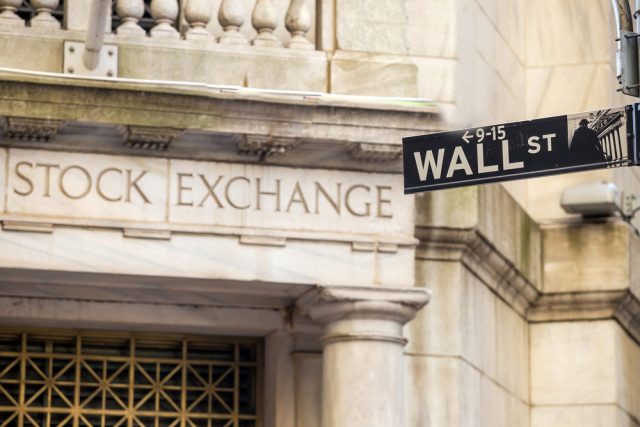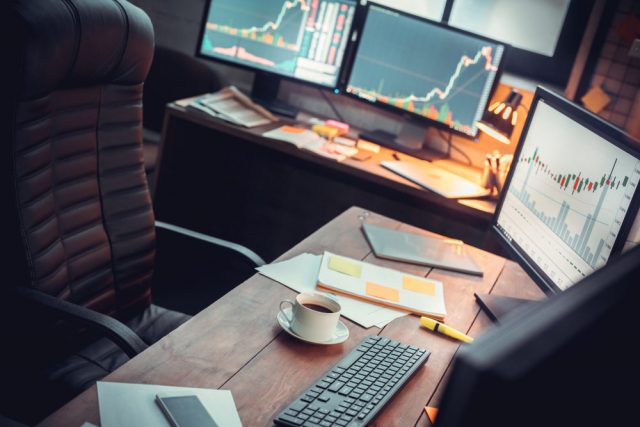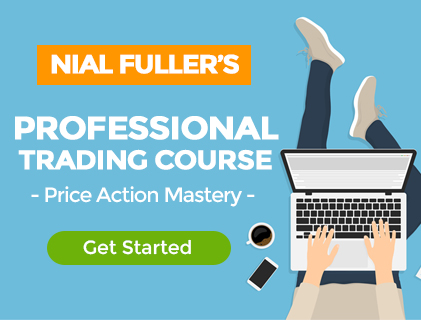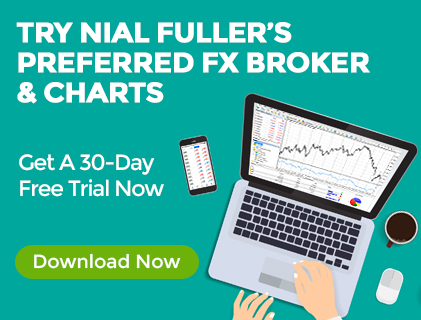 You might be shocked to hear this, but there aren’t many differences between you and a professional hedge fund manager. The only real differences are the balance of your trading account and your ability to control yourself.
You might be shocked to hear this, but there aren’t many differences between you and a professional hedge fund manager. The only real differences are the balance of your trading account and your ability to control yourself.
The world’s top money managers all started on a path similar to yours; they had to learn how to trade just like you, they had to master their craft, fine-tune their strategy and learn to master their emotions and control their behavior in the market. Mastering one’s emotions and controlling behavior is probably the biggest thing that separates the pros from the amateurs.
With enough screen time and experience, if you stick around long enough, just about anyone can begin to call a market quite confidently. But as many of you will all know by now, that alone isn’t enough.
As I mentioned, what really separates the ‘men from the boys’, is the ability of the pros to treat each trade as just another execution of their edge, without little to no emotional connection to it. Trading multi-million or billion-dollar hedge funds is certainly no easy feat and definitely not for the weak-minded.
The only way anyone could successfully trade these huge sizes and successfully trade for high net-worth clients, is by having complete and utter control of their minds and actions in the market.
Remember, it’s just zeros.
The ability to change how you think about the money in your trading account is what you really need to succeed at this game.
What professional hedge fund traders know and do, is think about the accounts they trade as score boards, keeping score in a giant world-wide game. The score is the trading account balance and to them, it’s nothing more than digits on a screen, the more zeros they rack up after the first couple digits the better they are doing.
Imagine managing a billion dollar position the same as you would manage a $1,000 position? The only way to accomplish this is by remembering it’s all just zeros; it’s just digits on a screen. If you start allowing yourself to truly “feel” the power of the money, you have already lost.
The ONLY true weapon you have as a small retail trader, is not allowing yourself to be affected by the money you have at risk in your account. This can be accomplished a number of different ways:
- Don’t trade with money you really can’t afford to lose.
- Know your overall net-worth, liquid money left over after debt.
- Risk a very small amount of your liquid money per trade.
- I like to do the “sleep test”; if you are able to sleep with your position on, then you’re good.
If you are doing all of the above, then the final step to trading your account like a hedge fund manager lies in how you think about the money you’re trading.
I can tell you from personal experience, that the only thing more potentially nerve-racking than trading your own real money, is trading someone else’s money. Thus, a hedge fund manager needs to have ‘ice in their veins’ (discipline, self-control), otherwise they are not going to get above average returns for their clients.
How do they do this?
By thinking of the money in your trading account as “just numbers”, a trader with a really big “baller” sized account, can remove the emotion from their trading decisions. They are simply thinking about their money differently than you are, and as a result, they are able to function in the market essentially as if they’re trading a demo account.
Have you ever traded a demo account successfully and then when you transitioned over to a real account you blew it out in a month? Why did this happen? Well, it’s simple; you were letting the money control you on the real account rather than you controlling how you thought about it (like you did on demo). Don’t let it affect you. You do this by following the 4 bullet points above and then remembering it’s just numbers, nothing more, just zeros on a computer screen.
You have to take the power back from the money, don’t let the money control you, you control you and as a result, you control the money in your account.
This might sound like some type of gigantic cliché motivational speaker type stuff to you, especially if you’ve just come off a bad streak of trading losses. But, I am telling you, from personal experience, that it’s a FACT that how you think about the money in your trading account directly influences whether or not you succeed or fail at trading.
Whether you think you can or you can’t, you’re right.
 I don’t want to get all Tony Robbins on you (I do like him though) but your mindset really has everything to do with your trading performance. Whether you think you can become a successful trader or you think you can’t, you’re probably right. The first step in achieving anything in life is convincing yourself you can do it and really believing it.
I don’t want to get all Tony Robbins on you (I do like him though) but your mindset really has everything to do with your trading performance. Whether you think you can become a successful trader or you think you can’t, you’re probably right. The first step in achieving anything in life is convincing yourself you can do it and really believing it.
In trading, you really have to “fake it till you make it” because that is the only way you will stay consistent and disciplined in your approach.
Let me explain…
Do you think a hedge-fund manager or simply a trader with a million-dollar account is sitting in front of his screens everyday, day trading? Would you do that if you had a large trading account?
No, you wouldn’t, and here’s why…
First, anyone who’s been around the trading world long enough knows that day-trading is the hardest way to make money and the most stressful. Put simply, there just aren’t a lot of high probability trading signals each week in the market to make a day-trading something that is more skill than gambling.
Hedge-fund traders do a lot of research, they have access to information that regular retail traders do not. They take a macro view of events and then check for opportunities via the price action on the charts. They are not just diving in and out of the market all day because some line crossed over another line (sounds stupid because it is).
The advantage that you have as a smaller retail trader, is price action is the great equalizer, the true footprint of money on the charts, it literally shows you what the hedge funds are doing. Then, you can combine that price action analysis with sickening self-control, consistency and discipline in your trading. This is literally the ‘recipe’ for retail trading success and the only way it’s possible, trust me, I know.
Where does the “fake it till you make it” come in you ask? Simple…
You literally have to trade your small trading account AS IF it’s a big account! How would a hedge-fund trade a big account? Slowly. Consistently. Masterfully. This is what I teach, this is how I trade.
You aren’t looking for quantity, you’re looking for quality of trades. One or two good trades a month is all you really need. You may have to wait patiently like a crocodile for days or even weeks either for an ideal trade to form or maybe for one you entered to play out. Either way, this slow, methodical approach, is what works. Using price action and intense self-discipline is how you will make your money as a smaller retail trader.
You aren’t going to ramp-up a tiny account into something you can live off of overnight. So, you have to fake it, until you make it. Trade that $1,000 account only risking $10 – $50 per trade for a year or two. Then, if you’ve proved to yourself you can do it, maybe you’ve doubled it. $1,000 profit may not sound like a lot over a year or two, but that’s a 100% return. Now, add a few zeros onto that $1,000 account and tell me if THAT amount matters?
You see, if I can get brutally honest with you for a minute…
Where most traders fail is in not understanding this simple point…
Until you can trade a small account successfully over a significant period of time, you will not be able to trad a larger account successfully. Thus account size, simply doesn’t matter.
Here’s what matters:
Bring it all together
 You know that dream you have in your head? The one where you are trading from a beach and making thousands of dollars per week without having to be stuck in traffic or talked down to by some a-hole boss? Don’t give it up. Don’t even think about it. I’m here to tell you, as living, breathing proof, that it IS possible. I have done it, and so can you.
You know that dream you have in your head? The one where you are trading from a beach and making thousands of dollars per week without having to be stuck in traffic or talked down to by some a-hole boss? Don’t give it up. Don’t even think about it. I’m here to tell you, as living, breathing proof, that it IS possible. I have done it, and so can you.
What you have to understand and truly believe, is that trading is a game that is almost entirely mental. This is why I don’t just teach you how to analyze price charts in my trading course and I am not just teaching a trade entry system. Whilst that stuff IS important, what you do with the trading method you use and learning how and when to implement it, is more important.
What professional hedge-fund managers either instinctively know or have learned through much trial and error, is that the trade entry is not the hardest part of trading. The hardest part is what happens after that; how you process the feelings that come along with trading, your thoughts, your hopes and fears.
I have spent the better part of my adult life being intimately connected with global financial markets, trading and investing is quite frankly my life-force. The lessons I share with you on this blog and in my trading course and members area, are literally what keeps me going. My entire existence and happiness is pinned to the idea of sharing my experiences with aspiring traders so that they can feel what I feel every day. The feeling of not having to be to work “on time” or having to answer to some boss who doesn’t really care about you, the feeling of being able to make money from a beach or from a coffee shop, that is what keeps me going. I want you to have that feeling and am telling you that it is possible if you simply change how you think about the money in your trading account and remember that you have the power to control how you feel and how you behave. Once you take that power back, you are on the right track.
What did you think of this lesson? Please leave your comments & feedback below!



